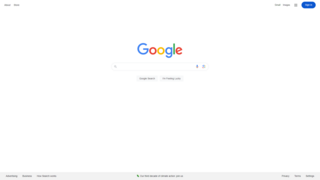
Google Search is a search engine operated by Google. It allows users to search for information on the Internet by entering keywords or phrases. Google Search uses algorithms to analyze and rank websites based on their relevance to the search query. It is the most popular search engine worldwide.
Spamdexing is the deliberate manipulation of search engine indexes. It involves a number of methods, such as link building and repeating unrelated phrases, to manipulate the relevance or prominence of resources indexed in a manner inconsistent with the purpose of the indexing system.

Islamic dietary laws are laws that Muslims follow in their diet. Islamic jurisprudence specifies which foods are halal and which are haram. The dietary laws are found in the Quran, the holy book of Islam, as well as in collections of traditions attributed to the Islamic prophet Muhammad.
Search engine optimization (SEO) is the process of improving the quality and quantity of website traffic to a website or a web page from search engines. SEO targets unpaid traffic rather than direct traffic or paid traffic. Unpaid traffic may originate from different kinds of searches, including image search, video search, academic search, news search, and industry-specific vertical search engines.
In web applications, a rewrite engine is a software component that performs rewriting on URLs, modifying their appearance. This modification is called URL rewriting. It is a way of implementing URL mapping or routing within a web application. The engine is typically a component of a web server or web application framework. Rewritten URLs are used to provide shorter and more relevant-looking links to web pages. The technique adds a layer of abstraction between the files used to generate a web page and the URL that is presented to the outside world.
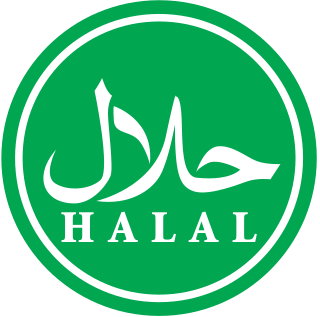
Halal is an Arabic word that translates to 'permissible' in English. In the Quran, the term halal is contrasted with the term haram. This binary opposition was elaborated into a more complex classification known as "the five decisions": mandatory, recommended, neutral, reprehensible and forbidden. Islamic jurists disagree on whether the term halal covers the first two or the first four of these categories. In recent times, Islamic movements seeking to mobilize the masses and authors writing for a popular audience have emphasized the simpler distinction of halal and haram.

Ask.com is a question answering–focused e-business founded in 1996 by Garrett Gruener and David Warthen in Berkeley, California.
Google AdSense is a program run by Google through which website publishers in the Google Network of content sites serve text, images, video, or interactive media advertisements that are targeted to the site content and audience. These advertisements are administered, sorted, and maintained by Google. They can generate revenue on either a per-click or per-impression basis. Google beta-tested a cost-per-action service, but discontinued it in October 2008 in favor of a DoubleClick offering. In Q1 2014, Google earned US$3.4 billion, or 22% of total revenue, through Google AdSense. In 2021, more than 38 million websites used AdSense. It is a participant in the AdChoices program, so AdSense ads typically include the triangle-shaped AdChoices icon. This program also operates on HTTP cookies.
Haram is an Arabic term meaning 'forbidden'. This may refer to either something sacred to which access is not allowed to the people who are not in a state of purity or who are not initiated into the sacred knowledge; or, in direct contrast, to an evil and thus "sinful action that is forbidden to be done". The term also denotes something "set aside", thus being the Arabic equivalent of the Hebrew concept חרם and the concept of sacer in Roman law and religion. In Islamic jurisprudence, haram is used to refer to any act that is forbidden by Allah and is one of the five Islamic commandments that define the morality of human action.
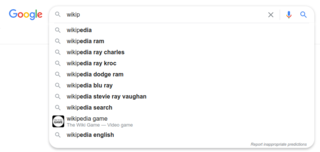
A search engine is a software system that provides hyperlinks to web pages and other relevant information on the Web in response to a user's query. The user inputs a query within a web browser or a mobile app, and the search results are often a list of hyperlinks, accompanied by textual summaries and images. Users also have the option of limiting the search to a specific type of results, such as images, videos, or news.

ChaCha was an American human-guided search engine that provided free, real-time answers to any question, through its website, or by using one of the company's mobile apps.
Google Questions and Answers was a free knowledge market offered by Google that allowed users to collaboratively find good answers, through the web, to their questions. It was launched on June 28, 2007 and replaces the fee-based Google Answers service, discontinued on December 1, 2006. Google had chosen Russia as the first country to launch this new service.

Cuil was a search engine that organized web pages by content and displayed relatively long entries along with thumbnail pictures for many results. Cuil said it had a larger index than any other search engine, with about 120 billion web pages. It went live on July 28, 2008. Cuil's servers were shut down on September 17, 2010, with later confirmations the service had ended.
A content farm or content mill is a company that employs large numbers of freelance writers or uses automated tools to generate a large amount of textual web content which is specifically designed to satisfy algorithms for maximal retrieval by search engines, known as SEO. Their main goal is to generate advertising revenue through attracting reader page views, as first exposed in the context of social spam.
A canonical link element is an HTML element that helps webmasters prevent duplicate content issues in search engine optimization by specifying the "canonical" or "preferred" version of a web page. It is described in RFC 6596, which went live in April 2012.

Islam is a minority religion in all of the countries and territories of the Americas, around 1% of North America population are Muslims, and 0.1% of Latin America and Caribbean population are Muslims.
Halalgoogling is an Islamic internet search engine, launched on 9 July 2013. During the holy month of Ramadan, Halalgoogling is used to block content that is deemed haram by Sharia law. It collects results from other web search engines such as Google and Bing and presents only the halal results to its users.
Halal literally means "permissible" in Arabic and refers to food items that are permissible to consume under Sharia law, whereas haram refers to any substance not permitted to consume. According to the Australian Food and Grocery Council, halal foods must be "free from any substance taken or extracted from a haram animal or ingredient ; [be] made, processed, manufactured and/or stored by using utensils, equipment and/or machinery that has been cleaned according to Islamic law ; and [be] free from contact with, or being close to, a haram substance during preparation, manufacture, processing and storage ."
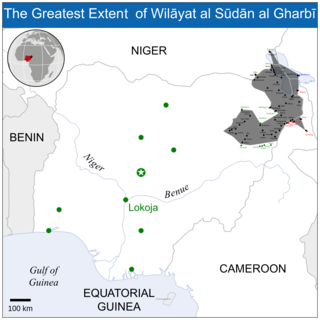
Starting in late January 2015, a coalition of West African troops launched an offensive against the Boko Haram insurgents in Nigeria.
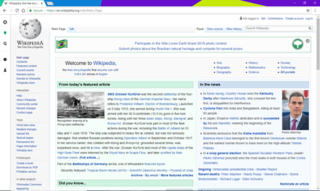
SalamWeb is a discontinued Chromium-based browser developed by the now-defunct Malaysian start-up Salam Web Technologies MY Sdn. Designed to deliver a Muslim-friendly Web experience, and targeted towards the Muslim audience, it observed the Islamic law and tradition and was certified as a Muslim compliant web browser.










